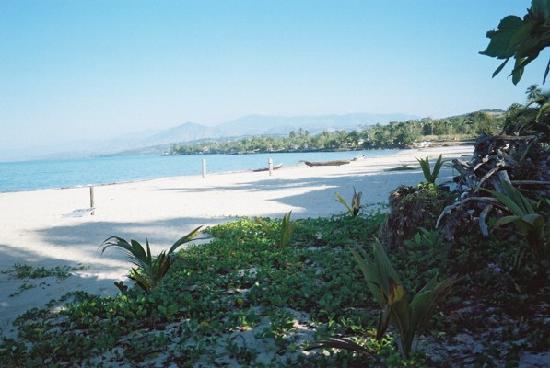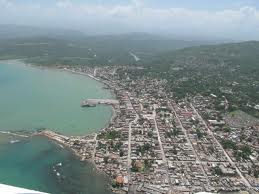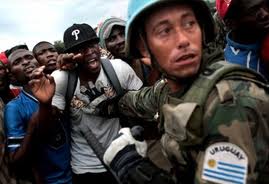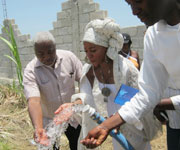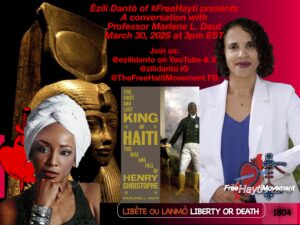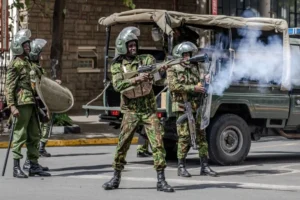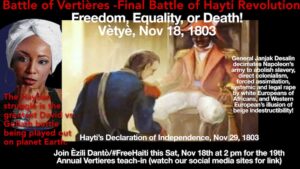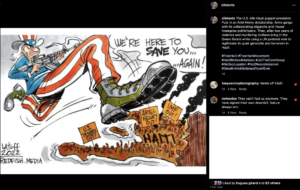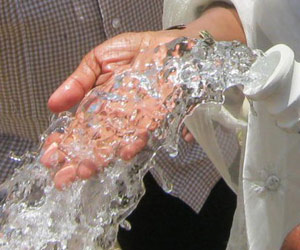MINUSTAH’s Gang Rapes
By Michaëlle Desrosiers and Franck Seguy
A l”Encontre
Translated from the French by Dady Chery for Haiti Chery, October 12, 2011
Source: Haiti Chery
MINUSTAH almost exclusively attacks those who are most despised, humbled, and impoverished. Thus, it assures itself a sickening legitimacy with the Haitian grandonarco-bourgeoisie and the petty bourgeoisie from which it recruits most of its local civilian personnel. MINUSTAH can strut, rape, hang, contaminate, and lie to its heart’s content in complete calm, since its interests are one and the same as those of Haiti’s “respectable citizens.”
Port-Salut, small coastal town in southern Haiti, known for lovely beaches and radiant landscapes deserving of postcards.
Since one week, a new element has been added to her reputation: it is the place where at least four Uruguayan soldiers of the misnamed UN Mission for Stabilization in Haiti (MINUSTAH) hid out and gang-raped an 18-year old Haitian boy.
If the act was perpetrated on Thursday July 28th, 2011, it was not until the end of August that it began to occupy the headlines. Part of the reason for this was because a video of the crime was broadcast on the internet. The soldiers themselves filmed this video and used it later as a movie, projecting it as a way to boast of their prowess. Worse, they did so in front of local teenagers, all friends of the victim. And it is precisely one of these teenagers who captured with his mobile phone some of the video footage that was released online by Haiti Press Network (HPN).
The video appeared on the web for only a few hours. It is unclear if its removal was a diplomatic move by the Uruguayan government or by the UN itself. You Tube justified this withdrawal by noting its policy of not promoting hatred, since many comments (over 4000) were strongly condenming the UN’s barbarity.
It took the deployment of MINUSTAH soldiers to ruin Port-Salut’s reputation as a haven of peace. In 1995, for example, the city had only 40 police officers. Although the size of the national police has grown, by 2004 Port-Salut had seven police officers. It was almost impossible to record an incident there more serious than the theft of a goat or a few sacs of potatoes.
Yet, paradoxically, since 2004, with the new occupation of the country by MINUSTAH, it became necessary to deploy a military contingent to (de)stabilize Port-Salut. Since nature abhors a vacuum and, as we well know, idleness is the mother of all vices, the military had to exercise what little brains it had to find some reason to justify its presence.
Gradually, they introduced child prostitution and the “cambiar” – a practice of the exchange of food for services like the purchase of hallucinogenic and / or illegal products such as tobacco, alcohol, marijuana”¦ All this appeared in a report published by the National Network for Human rights (Réseau National de Défense des Droits Humains, RNDDH) on Monday, September 4, 2011[1].
The boy’s rape should be viewed in this context. Indeed, to earn their daily living, many teenage sons and daughters of poor peasants like this boy forge close relationships with UN soldiers deployed across the country. The boy in Port Salut had befriended a soldier called Poncho from the Uruguayan contingent. This soldier apparently did not partake in the act. He was not even able to help the boy. The rapists had locked the room in which they did their criminal act to prevent the boy’s screams from reaching the ears of his “friend” Poncho.
The opulence in which the UN soldiers installed in Haiti live is shocking, to say the least. They settle into the best hotels in the cities; they strut on the beach on the weekdays as on the weekends, even more so in Port-Salut where the beaches are especially beautiful. In addition, they buy the young ones, prostitute them and”¦ rape them.
Not only do these soldiers enjoy an absolute impunity that has no place for respect of the law or any show of manners – but also their status as UN soldiers places them above the Haitian courts.
An even greater insult to the poor local police and other Haitian officials is the high salary of these soldiers. To compare: a soldier in Uruguay normally gets a monthly salary equivalent to US $ 400. In MINUSTAH, he gets $ 6,000. Though it is true that the Uruguayan government deducts a good part of this salary, MINUSTAH’s Uruguayan soldiers still have enough money and authority to believe they can permit themselves everything in Haiti.
In general, they save enough to buy a nice apartment and”¦ take it easy when they return to their country. One might wonder whether the Uruguayan government’s prompt complaint against its own troops in Haiti was not principally meant to preserve within MINUSTAH an economically viable Uruguayan presence for the benefit of Uruguay. This dedication to the Uruguayan government was also involved in the attempts to promote the idea that the rape perpetrated against the boy was an exceptional incident of which only four Uruguayan soldiers were guilty and not the modus operandi of the occupying forces. This is why it is always worthwhile to refresh one’s memory.
This is not MINUSTAH’s first gang rape
First it should be noted that this is not MINUSTAH’s first gang rape. Indeed, less than one year after MINUSTAH’s arrival in Haiti, specifically February 18, 2005, three Pakistani soldiers from the mission raped a young girl.
Although this was a criminal act that certainly raised the ire of many, especially women’s organizations, this was apparently more acceptable than the gang rape of a male. So far this case has gone unpunished and was filed away.
Today, in gang raping a young boy, MINUSTAH tackled head-on a morality that is Christian, macho, dominant, and very strong in Haiti. The Christians were quick to scream about the abomination, and the lawyers and other opinion makers about the undoing of the boy’s dignity and identity. In other words, he ceased to be a man on being raped by four armed men – which means in the macho culture that he ceased to exist.
It is noteworthy that the boy came from the lower classes of Haiti’s peasantry. His education level illuminates this reality very well. At 18, Johnny is still in junior high school (5eme). He could not attend school during the 2010-2011 academic year, for lack of money. He is his mother’s fourth son, and his brothers, to speak more correctly, half-brothers, are not from the same father. The different surnames in the RNDDH report attest to this important fact.
To produce several sons by different fathers is the result of two closely linked phenomena encountered in Haiti’s lower classes: paternal abandonment and its corollary, serial monogamy. The mother of an abandoned child hooks up with another man so as to survive along with her child. A new child born from this connection is again abandoned by the father. She starts again with a third man in the same way, finding enough to survive with her “fatherless children.” In the process, she produces several children by different fathers, with different surnames, of course, if they are “lucky” enough to be legally acknowledged by their fathers.
MINUSTAH has systematically aimed its abuses at the poor. Its rapes, murders, and assaults are directed against those in run-down areas like Cite Soleil [2], helpless young women and men.
In this regard, RNDDH reports the well-known case of the hanging of 16-year old minor Gerald Jean-Gilles on a Nepalese military base in the north of country, at Carenage, Cap-Haitien (second largest city). MINUSTAH did everything to pass off this crime as a suicide. Except that suicide is a relatively foreign concept in Haiti. Like the boy in Port Salut, Gerald Jean-Gilles was engaging in “cambiar” with UN soldiers, that is to say he rendered small services to them in exchange for food.
Thus, like a true occupation force, MINUSTAH uses rape as a weapon of war. It humiliates, exploits, and demeans those who are most peaceful, those who come into contact with it so as to survive, or simply because they are poor; those whose complexion is very dark because their skin has been burned by Haiti’s scorching sun; those who have the misfortune to live in Cite Soleil and other “no-go zones.”
In exclusively attacking those who are poorest, MINUSTAH, as an occupation force, introduces a different relationship compared to its predecessors in the practice of military invasions on Haitian soil. Indeed, under the official U.S. occupation of Haiti (1915-1934), innovative on Haitian soil, the entire racist U.S. arsenal was unleashed against mulattoes, rich blacks and poor blacks alike. This forced those who initially supported the invasion to ally themselves to the anti-occupation struggle. Although in its most “peaceful” form this consisted of written propaganda, it goes without saying that this contribution strengthened the struggle and gave renewed vigor to the Cacos revolutionaries, previously treated as vagrants by the invaders as well as by the ruling class of mostly mulattoes.
So MINUSTAH has been more vigilant, one might say, in almost exclusively attacking those who are most despised, humbled, and impoverished. Thus, it assures itself a sickening legitimacy with the Haitian grandonarco-bourgeoisie and the petty bourgeoisie from which it recruits most of its local civilian personnel. MINUSTAH can strut, rape, hang, contaminate, and lie to its heart’s content in complete calm, since its interests are one and the same as those of Haiti’s “respectable citizens.”
Speaking of lying, the gang rape of this young man was not the last of MINUSTAH’s actions denounced by the people of Port-Salut. Indeed, during the same month of August, a local organization denounced in a press release the “poor behavior” of the Uruguayan contingent. In response, MINUSTAH investigated itself. This investigation, of course, resulted in the total and categorical denial of the facts and concluded that these were “allegations of misconduct without any foundation.”
Among the complaints against the soldiers:
“Child prostitution, voyeurism, environmental pollution, use of marijuana in the presence of minors, behavior that is demeaning, derogatory, insulting, disrespectful, and unfair to the citizens of Port-Salut” [4].
An interesting thing is that a few days before the gang-rape video of the 18-year-old boy was broadcast on the Internet, the UN force had supposedly concluded this alleged investigation and was on the verge of accusing the organization CREDOP of defamation. However, the rape and its diffusion on the Internet showed not only that the soldiers violated and humiliated the young man but that they took a very filthy pleasure in it. The astonishing fact in all this is that in his demand for apologies after the video and its aftermath, Chilean MINUSTAH chief Mariano Fernandes neglected to apologize for the false report of the investigation released a month earlier.
If once again MINUSTAH occupies the headlines in the Haitian news, at a time when everyone is more concerned about formation of a new government or the reopening of classes, it is not even because “A new study demonstrated its involvement in the criminal transmission of cholera” [5] – an epidemic, which to this day, has already killed over 5,000 Haitians. It is also not because of a new discharge of fecal matter in the country’s rivers [6], as it has been wont to do since October 2010.
Those of good faith who have so far not been moved must eventually understand that MINUSTAH is not a very angelic mission. On the contrary! One could even say that it is profoundly “evil”! Its misdeeds are as grotesque and scandalous as its impunity and the admissions more or less covered-up by the international community [7].
MINUSTAH is sexist and racist. It is openly at war against the masses. Its active participation in the supression of protests throughout the country, and especially those concerning the struggle for a minimum-wage increase are a vibrant testimony.
In this respect, the same RNDDH report indicates:
“On May 12, 2011, Gena Widerson, a 14-year old student (7eme) at the Classic College of Verrettes, Artibonite Department, was injured by two projectiles fired by MINUSTAH soldiers. This incident occurred when students of the Lycée Jacques Stephen Alexis organized a protest against the removal of one teacher. ”
In fact, the repression against any hint of class or popular struggle is systematic on the part of the UN mission.
To silence, humiliate, rape, and prostitute: this is MINUSTAH’s creed.
Below is an excerpt of some cases of rape, robbery, beatings, murder and illegal and arbitrary arrests perpetrated by MINUSTAH and recounted in the report of RNDDH:
1. On February 18, 2005, three MINUSTAH Pakistani soldiers in Gonaives raped a young girl;
2. On March 20, 2005, Tele Contact radio journalist Robenson Laraque was fatally wounded by bullets fired by MINUSTAH soldiers who had replaced the military from the old police station in Petit-Goave;
3. On 26 November 2005, at Carrefour Trois Mains, on Airport Road, a young woman was forced to fellate a Jordanian soldier before being raped and sodomized by him;
4. On December 20, 2006, Stephane Durogene, student (3eme) at the Center for Economic Education and Classic (CFCE) was injured in his left eye by projectiles fired by MINUSTAH soldiers as he passed close to the police station in Delmas 62;
5. On November 3, 2007, 111 Sri Lankan officials were implicated in cases of abuse and exploitation of minors;
6. On May 29, 2008, police officer Jacques Luckner, assigned to the Cite Soleil police station, was molested by MINUSTAH soldiers;
7. On August 6, 2008, MINUSTAH soldiers beat two policemen Donson Bien-Aimee and Ronald Denis, both assigned to the Cite Soleil police station. These acts were perpetrated against the victims despite the fact that they had clearly identified themselves;
8. On August 18, 2010, Gerald Jean Gilles, an orphan and minor of 16 years old, was found hanging from an almond tree on the Nepalese base of MINUSTAH in Carenage, Cape Haitian. This boy frequented the based and rendered small services to MINUSTAH agents;
9. In mid-October 2010, the Nepalese MINUSTAH soldiers in Mirebalais were involved in the emergence and spread of cholera in Haiti due to release of their human wastes into the rivers Boukan Kanni and Jenbe, causing considerable loss of life;
10. On May 12, 2011, Gena Widerson, a 14-year old student (7eme) at the College Classic Verrettes, Artibonite Department, was injured by two projectiles fired by MINUSTAH soldiers. This incident occurred when students of the Lycée Jacques Stephen Alexis organized a protest against the removal of one teacher.
These facts are not exhaustive. However, in all the above cases, RNDDH brings into focus the responsibility of MINUSTAH and consequently, that of the UN, because it is unacceptable that soldiers belonging to the UN force were operating outside of any rule of accountability and engaging in nefarious activities of all kinds while under cover of immunity conferred by the UN.
References
[1] Following the uproar caused by this case, RNDDH traveled to Port-Salut to conduct an investigation. This report was published by several Haitian media. The version cited in this article is published online by haiticonnexion.
[2] The largest Haitian slum where, during summer 2005, MINUSTAH entered and killed dozens of people including pregnant women and children.
[3] The grandonarco-bourgoiesie refers to economic and political practices of the bourgeois-gran dons of Haiti. This concept of grand dons-bourgeois or bourgeois-grand dons (grandonboujwa in Haitian Creole) was coined by Jean Anil Louis-Juste specifically to describe Haitian capitalism. In Haiti, it is difficult to identify a single bourgeois who is not also a landowner (Grandon in Creole). However, these lands are not included in capitalist production, but are worked by peasants and rural workers who pay rent to the Grandon. As for the bourgeois, they are found especially in the business of import-export. So they are not just grandon or just bourgeois. Hence the designation grandons bourgeois. We talk about grandonarco-bourgeoisie to draw attention to the fact that the bourgeois Haitian grandons basically function like a family where very few people control most of the economy and national wealth.
[4] Haiti: Port-Salut denounces abuses by MINUSTAH Uruguayan soldiers, published by www.hpnhaiti.com on 11/08/2011.
[5] Haiti-Cholera: study confirms Nepalese origin, published by www.hpnhaiti.com on 24/08/2011.
[6] Haiti: discharge of faecal matter, MINUSTAH recurrence, published by www.hpnhaiti.com on Wednesday, August 10, 2011.
[7] We borrow this concept from the sorely missed late Jean Anil John Louis Juste, shot dead by bullets on 12 January 2010 some three hours before the earthquake. The use of the concept to describe the so-called international community set in motion to destroy the communist ideal represented by the Communist International, already at the Congress of Bretton Woods, derives its relevance in the memory of the struggle of teacher and activist Louis-Juste for the emancipation of Haiti, not only from UN troops but also from capitalistic and neocolonialist relationships of dependence. It is not trivial to recall that in 2009 he was actively sought out by the occupation forces for allying himself to the struggle to raise the minimum wage of Haitian workers to 200 gourdes, or US $ 5 per day.
Sources: A l”Encontre (French) / Diaro Octubre (Spanish translation) / Translation from French to English by Dady Chery for Haiti Chery / Images added by Haiti Chery
***********************************************
Haitian Lawyers Leadership Network (HLLN)
**************************************************
Without your support, it’s not possible to continue folks, or do more to defend indigenous Haiti. If you appreciate Ezili/HLLN works and writings: Book an appearance to support the human rights, Zili Dlo humanitarian relief and cultural work of Ezili Dantò of HLLN . Write to erzilidanto@yahoo.com put
“booking Ezili Dantò” in the subject line.
Video Reel excerpts from the Ezili Dantò Red, Black & Moonlight Vodun Jazzoetry
series at – http://bit.ly/aAD1CN
Click on Profile Pictures at
http://on.fb.me/q828ml
Ezili Danto live in Miami with Sanba Yatande, TiRouj & Manno
http://bit.ly/5EFWjv
Ezili’sHLLN would like to hire a booking and a literary agent. If you are one or personally know a good booking or literary agent, let us know. All such inquiries are welcome.
Thank you for the support.
Men Anpil Chay pa lou – Many hands make light a heavy load
Add a comment:
Powered by Facebook Comments

